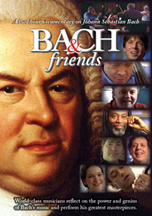Bach Project - Peter Schickele
Peter Schickele
PDQ Bach

I think the easiest way to describe PDQ Bach is that
he was the twenty-first of Johann Sebastian Bach’s twenty children
and certainly the oddest of the lot.



PDQ Bach has been called a pimple on the face of music.
And although he did follow the typical Bach pattern
of going into music and becoming a composer,
he did it in a very strange way since he was a well-known plagiarizer.



There are a lot of things he didn't write but I mean
many eighteenth century composers occasionally borrowed a theme
from one of their peers but I think that PDQ Bach was the only composer
who worked on tracing paper and it shows up on his works.



One of the strongest examples of PDQ Bach’s innovation
of his being years ahead of his time, years before Bill Monroe,
he actually invented the bluegrass medium in this cantata,
Blaues Gras, the Bluegrass Cantata,
and it’s for bluegrass band and a baroque orchestra.



He wrote for some extremely unusual things.
PDQ Bach has a history of playing off
the imbalance between certain instruments.



For instance, the Pervertimento
for Bicycle, Bagpipes and Balloons.
Very touching.



Well the three basic periods of PDQ Bach’s creative life
were the initial plunge, which he spent in Vienna
learning the basic rules of musical composition.



Then came the soused or brown bag period,
by far the longest period of his life,
which he spent in Weinheim-Rhein
forgetting the basic rules of composition.



And then the last period, contrition which he spent
in the charming southern German town of Boddin-Boddin-Boddin,
trying to work off a monumental hangover,
which the recent discovery of his skull indicates he may still have.



Using the very sophisticated alcohol dating technique,
it has been estimated that PDQ’s last hangover
has a half-life of about 245 years.






